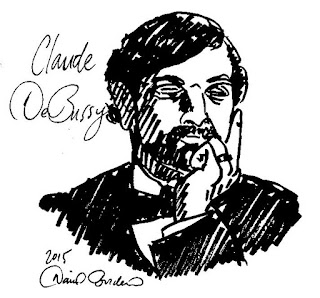Classic Cocktails and Classical Music: De Bussy
A Musical Impressionist
Claude De Bussy died of colon cancer as the Germans shelled Paris in March of 1918 with the the largest artillery piece devised up until that time, the Pariskanone. The Germans fired shells from 74 miles away, killing or wounding 260 Parisians that spring and summer. The casualties would have been higher, except that Parisians stopped gathering in large groups to reduce the likelihood of a any given shell injuring a lot of people.
Somehow this ending to a tumultuous life and career is fitting. He called himself the "French Musician" after becoming disillusioned with Wagner (Hooray for De Bussy... don't get me started on Wagner!) and revolting against the German tradition.
He didn't like people and hated to socialize. After winning the Prix de Rome, he left Rome a year early because he hated Italian food and the other students in the classes that came along with the prize. He made fun of the renowned teacher, Cesar Franck, under whom he studied at the Conservatoire. He nearly got in a duel with the libretto writer of his one opera. His many affairs with women: girlfriends, wives (his own and others), and mistresses all ended terribly. Two of his wronged lovers shot themselves, the latter of which causing quite the scandal). He got along better with cats than people and always had at least one... usually a Siamese.
However, he transcended his inability to relate to people, his physical ugliness, and the enormous pain he endured as colon cancer slowly consumed him. He brought us music as impression (though he hated being called an Impressionist, as did the Impressionist painters of his day). He may have been the first true Twentieth Century composer by breaking the classical forms, introducing new scales, proclaiming the symphony as dead, trying to convey feelings without resolving chords, and retreating from the current trend of using the piano as a percussion instrument (like Liszt).
To understand his sensibility, you have to understand his world view, based in a love of the natural world and a rejection of the music of his day. He said, "I desired for music that freedom of which it is capable perhaps to a greater degree than any other art, as it is not confined to an exact reproduction of nature, but only to the mysterious affinity between Nature and Imagination."
From early masterpieces such as Clair de Lune to later works, such as Sonata for Cello and Piano, you get the sense that De Bussy cut his own path in a time when grandiose ostentation reigned from the godlike, cliche-ridden, ethno-centric Wagner and his exponents.
There are those who argue that without De Bussy, we could have no Stravinsky, that De Bussy laid the foundations for the direction music took in the Twentieth Century. I don't know if that is true, but, in my opinion, he's one of the greatest composer ever, and certainly the greatest from France.
I'm going to pair De Bussy's music with one of the most decadent drinks I make because De Bussy had a taste for the finer things.
My Recipe for a Sherbet Royale
1 oz. brandy
2 oz. creme de cassis
2 oz. champagne
crushed ice
fresh blackberries
Pour brandy, creme de cassis, blackberries, and a handful of ice into a blender. Blend until you have a frothy sorbet. Spoon the icy concoction into two flutes. Top with champagne.
#ClaredeLune #DeBussy #Composer #classicalmusic #FamousCatLover #cocktail #cocktailrecipe #champagne #SherbetRoyale #CremeDeCassis #brandy #cestbon #SiameseCat
 |
| Claude DeBussy |
Somehow this ending to a tumultuous life and career is fitting. He called himself the "French Musician" after becoming disillusioned with Wagner (Hooray for De Bussy... don't get me started on Wagner!) and revolting against the German tradition.
He didn't like people and hated to socialize. After winning the Prix de Rome, he left Rome a year early because he hated Italian food and the other students in the classes that came along with the prize. He made fun of the renowned teacher, Cesar Franck, under whom he studied at the Conservatoire. He nearly got in a duel with the libretto writer of his one opera. His many affairs with women: girlfriends, wives (his own and others), and mistresses all ended terribly. Two of his wronged lovers shot themselves, the latter of which causing quite the scandal). He got along better with cats than people and always had at least one... usually a Siamese.
 |
| Claude DeBussy as a Crazy Cat Man |
However, he transcended his inability to relate to people, his physical ugliness, and the enormous pain he endured as colon cancer slowly consumed him. He brought us music as impression (though he hated being called an Impressionist, as did the Impressionist painters of his day). He may have been the first true Twentieth Century composer by breaking the classical forms, introducing new scales, proclaiming the symphony as dead, trying to convey feelings without resolving chords, and retreating from the current trend of using the piano as a percussion instrument (like Liszt).
To understand his sensibility, you have to understand his world view, based in a love of the natural world and a rejection of the music of his day. He said, "I desired for music that freedom of which it is capable perhaps to a greater degree than any other art, as it is not confined to an exact reproduction of nature, but only to the mysterious affinity between Nature and Imagination."
From early masterpieces such as Clair de Lune to later works, such as Sonata for Cello and Piano, you get the sense that De Bussy cut his own path in a time when grandiose ostentation reigned from the godlike, cliche-ridden, ethno-centric Wagner and his exponents.
There are those who argue that without De Bussy, we could have no Stravinsky, that De Bussy laid the foundations for the direction music took in the Twentieth Century. I don't know if that is true, but, in my opinion, he's one of the greatest composer ever, and certainly the greatest from France.
I'm going to pair De Bussy's music with one of the most decadent drinks I make because De Bussy had a taste for the finer things.
My Recipe for a Sherbet Royale
1 oz. brandy
2 oz. creme de cassis
2 oz. champagne
crushed ice
fresh blackberries
Pour brandy, creme de cassis, blackberries, and a handful of ice into a blender. Blend until you have a frothy sorbet. Spoon the icy concoction into two flutes. Top with champagne.
#ClaredeLune #DeBussy #Composer #classicalmusic #FamousCatLover #cocktail #cocktailrecipe #champagne #SherbetRoyale #CremeDeCassis #brandy #cestbon #SiameseCat




Comments
Post a Comment